Vol 4 No. 49 TROPIC LIGHTNING NEWS December 8, 1969
Index
Warriors, Dragons Join Forces
Super ‘Bush: A Deadly Plant for 32 Foe
By SP4 Jim Williams
and PFC Greg Stanmar
Forces of the 2d Battalion, 12th Infantry Warriors and the 2d Battalion, 14th
Infantry Golden Dragons were combined recently for a three-day operation known
by infantrymen of the Fire Brigade as the “Super Bushmaster.” Thirty-two enemy
died.
The “Super Bush” had all the prior planning of the most sophisticated war
movie. Coordination, logistics, command and control, secrecy and deception all
played a part in the success of the mission which was to deny the enemy freedom
to move at night.
THE GOLDEN Dragons were picked up at noon of the first day and inserted near
the site of their ambush.
Later in the day a fake extraction was staged. The helicopters landed at the
pickup zone with two men lying on the floor of the aircraft. When the choppers
took off, these men sat up to make it look as if the craft carried a full load
of troops.
The Warriors of the 2d Battalion, 12th Infantry committed three companies to
the Super Bushmaster. Ambush sites were set up north of Fire Support Base
Pershing. Alfa, Bravo, and Delta Companies set three ambushes each on two
successive nights along the southern edge of the Boi Loi and Ho Bo Woods.
BRAVO COMPANY of the Warriors’ was first to make contact killing three NVA in
holes. Two hours later sharpshooters from Bravo Company engaged a number of
enemy at 200 meters resulting in one enemy killed.
Later in the evening a Fire Brigade PSYOPS helicopter on a “Nightsquawk”
mission flew over a band of NVA. The enemy laughed and cheered. The Dragon’s
reconnaissance platoon joined the party killing eight enemy who had laughed
their last.
A squad leader of the Warriors’ Delta Company, Specialist 4 Joe Halberstadt
of Richmond, Ind., described the scene at his location. “We set up in an area
that must have been used in the past for ambushes. After it got dark we could
hear the enemy in the distance talking and shouting and making a real
commotion.”
“We just sat and waited,” added Private First Class Mike Brady of Fort
Morgan, Colo. “Less than 20 minutes later, along came five enemy soldiers.
They were just strolling along. Two of our claymores and small arms fire did
them in.”
CHARLIE COMPANY, 2d Battalion, 14th Infantry also engaged a sizeable enemy
force during the operation. Late at night a platoon of NVA unwittingly walked
into the sights of the company’s organic weapons. Six enemy were killed in the
action that followed.
(Continued on Page 8)
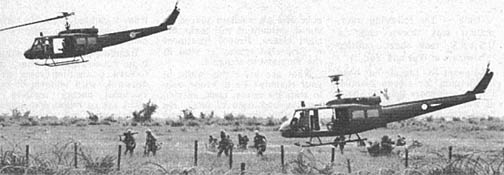 |
| WEARY INFANTRYMEN of the 2d Battalion, 12th Infantry head for the wire at Fire Support Base Pershing as their transportation lifts off for another load after a two-night “bushmaster” along the southern edge of the Ho Bo and Boi Loi Woods. (Photo by SP4 Jim Williams) |
Tomahawks Crash NVA Meal, Kill 10
SP4 JOHN W. FRAME
Tomahawks scouts killed ten enemy soldiers when they caught an NVA unit on
its way to chow. The scouts had been setting up a night laager position between
Fire Support Bases Rawlins and Hunter, when reports told the Tomahawks that a
fly-by-night enemy mess hall had been set up nearby in the rubble of an old
plantation. The enemy troops in the Crescent area southeast of Tay Ninh City
were moving in at night to fill their empty stomachs.
A nine man AP was sent out from the scouts’ laager site. The lead element of
the AP was checking the reported site when it encountered two NVA face to face.
Instantly the AP leader, Sergeant Terry W. Basham of Henryville, Ind., popped a
grenade and heaved it at the two enemy.
“They were less than 15 meters from us when we spotted them,” said Basham.
As soon as the grenade exploded the AP began receiving small arms fire and
RPG fire from an estimated company-size enemy element.
“WE RETURNED fire with small arms, M-60 machine gun and M-79 fire,” said
Private First Class Otis W. Ford of Danville, Ky.
“Muzzle flashes from the enemy’s weapons gave away their positions, and we
were able to fire very effectively,” continued Ford.
At this time Basham gave orders to rally and all the AP members met at the
final predetermined rally point, 100 meters from where the contact was made.
THE REMAINDER of the scout platoon reacted from its laager position and in a
matter of a few minutes came to the aid of the AP. Artillery was called in on
all of the logical escape routes. With the aid of APCs, the entire scout
platoon moved into the area. Movement was spotted and engaged on both flanks
and to the front, resulting in at least eight more enemy dead. The entire
platoon set up a laager position in the area for the remainder of the night. At
daybreak a search of the area revealed two AK-47s, NVA web gear, AK magazines
and numerous AK rounds.
The following day the nine men of the AP received impact awards from
Brigadier General David S. Henderson, Assistant Division Commander, for their
bravery.
Tankers, Regulars Trip Up 25
By SGT WALLY BAKER
TAY NINH - There are 25 less inhabitants on the rocky slopes of Nui Ba Den,
thanks to the efforts of a combined force of First Brigade soldiers, aided by
artillery and Air Force.
Delta Company, 3d Battalion, 22d Infantry was on a sweep of Nui Cau, the
northeastern tip of the Black Virgin, when it came under mortar attack and small
arms fire from an unknown-sized enemy force.
The intense barrage of enemy fire kept the Regulars pinned down at the bottom
of the mountain until elements of Alfa Company, 2d Battalion, 34th Armor arrived
at the scene to blast the enemy position.
Sniper fire made it impossible for the Regulars to withdraw to the
Dreadnaughts’ position, so the men set up and returned fire.
The Regulars, having had some wounded from the sniper fire, had the
Dreadnaughts bring in armored personnel carriers to extract them. APCs moved
in, pouring .50-caliber machine gun fire into the enemy’s position, and
extracted the Regulars’ wounded and helped them pull back.
Army gunships and Air Force jets were called in and poured their devastating
loads on the snipers’ positions. Later sweeps located the 25 enemy dead.
SP6 Lawrence Joel: Portrait of a Hero
By SP5 DAN DELANEY
TAY NINH - A man who received the nation’s highest award for valor, the Medal
of Honor, has voluntarily returned to Vietnam because, “There is a job to do
here and I want to do my part.”
Specialist 6 Lawrence Joel, now assigned to the 25th Medical Battalion in the
1st Brigade’s area of operations, distinguished himself while serving with
Headquarters Company, 1st Battalion, 503d Infantry, 173d Airborne Brigade in
Nov., 1965.
“A lot of people have their pro and con opinions about the war,” said Joel,
“but I still think we are doing the right thing here.”
“WE HAVE made progress in this country; it is evident.”
“I want to do what I can here, to serve my country as best I can,” he added.
Joel requested duty with the First Brigade Lancers in order to serve again
with Colonel John E. Tyler, brigade commander. Tyler, then a Lieutenant
Colonel, was commander of 1st Battalion, 503d Infantry when Joel won his Medal
of Honor.
“I saw Colonel Tyler back in May of this year,” said Joel, “and he said he
was returning to Vietnam in August.”
“‘Don’t be surprised if you see me there,’ I told him.”
“‘Okay, Joel,’ he said, ‘Come on over, we’ll be glad to have you.”
IN A WHITE House ceremony, President Lyndon Johnson presented the Medal of
Honor to Joel while his wife and children and “about a hundred and fifty
relatives and friends observed,” among them Colonel Tyler.
“I never felt more proud of anything in my life,” said Joel, who also holds
the Combat Medic’s Badge and three other decorations. “It opened up a new view
of American life for me, a side I had never seen before.”
(Continued on Page 8)
| Reckless driving back on the block might only cost you a fine and a lecture from a policeman. But in Vietnam it just could cost you a whole lot more. Speeding through villages and around the ever-present motorbikes on the roadways could cause you or innocent civilians serious physical harm and could also set back efforts to show the people our concern. Obey speed limits, use common roadway courtesy and DEROS - do it the safe way. |
 |
TOMAHAWKS of the 4th Battalion (Mechanized), 23d Infantry search through a rubber plantation southeast of Tay Ninh City. The night before a Tomahawk ambush killed ten NVA in the same area. (Photo by SGT Bill Oberholzer) |
Page 2 TROPIC LIGHTNING NEWS December 8, 1969
Decorated
| SILVER STAR | |
| LTC J. Coggins, 4th Bn, 23d Inf | CPT James M. Weller, A Trp, 3d Sqdn, 4th Cav |
| DISTINGUISHED FLYING CROSS |
|
| CPT William E. Cavanaugh, HHC, 2d Bde WOl Howard R. Lusk, HHC, 3d Bde |
WO1 Norwood R. Richardson, HHC, 1st Bde |
| SOLDIER'S MEDAL |
|
| MAJ Michael C. Lanham, DISCOM MAJ Howard L. McAllister, DISCOM MAJ Floyd F. McGurk, DISCOM |
MAJ Leon K. Moraski, DISCOM SP4 James T. Carney, HHC & Band/DISCOM |
| BRONZE STAR FOR HEROISM |
|
|
LTC Lewis W. Wright, 2d Bn, 77th Arty MAJ Henry G. Gillespie Jr., HHC, 3d Bde CPT Michael K. Anderson, HHC, 2d Bn, 34th Armor CPT Ralph G. Laubecker, HHC, 1st Bn, 5th Inf CPT Joseph E. Root, Co C, 1st Bn, 5th Inf CPT Earl M. Yamada, Co D, 2d Bn, 14th Inf 1LT Ian L. Natkin, HHC, 3d Bn, 22d Inf 1LT Andrew D. Smith III, Co C, 4th Bn, 9th Inf 2LT William P. Priest, Co C, 2d Bn, 14th Inf 1SG William J. Cronin, Co C, 1st Bn, 5th Inf SFC Wilfred K. Kapule, Co, D, 2d Bn, 14th Inf SFC Thomas Rosales, Co E, 3d Bn, 22d Inf SGT Alexandro Champion, Co D, 2d Bn, 14th Inf SGT David L. Hamill, Co E, 3d Bn, 22d Inf SP5 Timothy M. Graham, B Trp, 3d Sqdn, 4th Cav |
SP5 John H. Omeara, Co E, 65th Engr SP4 Frank D. Aviles, Co B, 2d Bn, 14th Inf SP4 Daniel J. Cooper, D Trp, 3d Sqdn, 4th Cav SP4 John Frank, Co A, 2d Bn, 34th Armor SP4 Robert L. Gammon, Co B, 2d Bn, 14th Inf SP4 Robert Munoz, Co A, 2d Bn, 22d Inf SP4 William T. Petruik, Co B, 2d Bn, 14th Inf SP4 Wesley L. Reeves, Co E, 3d Bn, 22d Inf SP4 Willie Shiner, Co C, 65th Engr SP4 Gary J. Tinin, Co E, 3d Bn, 22d Inf PFC Leslie E. Eckstein, D Trp, 3d Sqdn, 4th Cav PFC Allan R. Kalk, D Trp, 3d Sqdn, 4th Cav PFC Richard Karel, Co D, 2d Bn, 14th Inf PFC Dennis Leuthner, HHC, 65th Engr PFC Llyod J. Moreau, Co D, 2d Bn, 14th Inf |
| AIR MEDAL FOR HEROISM |
|
| LTC Frederick C. Delisle, HHC, 1st Bn, 5th Inf CPT William H. Courtney, HHSB, 7th Bn, 11th Arty 1LT Fred M. Perryman, HHB, Div Arty 1LT John Thomas Jr., D Trp, 3d Sqdn, 4th Cav |
CW2 Robert J. Reynolds, 25th MID W01 Andrew L. Neill, HHB, Div Arty MSG Lawrence E. Miller, HHB, Div Arty MSG Harlan J. Mohn, HHB, Div Arty |
Treatment of Prisoners:
How Should You Act?
(Note - The following information was drawn from a USARV fact sheet entitled
“Prisoners of War and You.”)
Sergeant Joe Lincoln has been in Vietnam for eleven months. He has seen more
than his share of war, and lots of his friends have been killed or crippled. He
is “short,” and he doesn’t want the same thing happening to him.
Joe heads out on one of his last patrols. As it enters a wood, the pointman
spots a wire and everybody freezes while he checks it out. Without realizing
it, the pointman brushes the trip wire and sets off a booby trap, killing
himself and wounding three others. Joe Lincoln is unharmed.
Seconds later, a Vietnamese man comes out of the wood, wary at sound of the
explosion. Joe, filled with anguish, disgust and hatred, sees the man and
points his M-16 at him. Maybe he is the Viet Cong who set the trap. Maybe he
is a communist sympathizer. Or maybe he is just a civilian farmer, startled by
the explosion.
Joe Lincoln is faced with a tragic dilemma. A basic instinct cries out for
revenge, but he realizes at the same time the importance of proper treatment of
prisoners and suspects for intelligence. Hopefully, Joe Lincoln and all
soldiers placed in similar situations will make the right choice. Proper
treatment of suspected enemy is vital in the Vietnamese struggle.
What are his rights while in your custody? He is bound only to state his
name, rank, service number and date of birth. He may retain personal effects
and items of no military value. He has a right to be evacuated swiftly, safely
and humanely from a combat area. He should not be exposed to unnecessary
dangers.
Handling prisoners in Vietnam is no cut-and-dried matter. The Geneva
Convention rules were drawn up with uniformed, conventional enemy soldiers in
mind, not guerrillas who may include women and children who dress in civilian
garb. The last thing we want to do, however, is alienate an innocent civilian.
TROPIC LIGHTNING
Combat Honor Roll
 Private First Class Steven Kirkegard of Bravo Company, 2d Battalion
(Mechanized), 22d Infantry has been added to the Tropic Lightning Combat Honor
Roll.
Private First Class Steven Kirkegard of Bravo Company, 2d Battalion
(Mechanized), 22d Infantry has been added to the Tropic Lightning Combat Honor
Roll.
In mid-October Kirkegard was serving as a rifleman with Bravo Company when it
engaged a large enemy force in well-concealed bunkers. During the first
exchange of fire, one of Bravo’s pointmen was wounded and pinned down.
Kirkegard immediately began to place heavy fire on the enemy positions and at
the same time moved to the aid of the wounded man. As he maneuvered through the
area, he spotted several camouflaged enemy bunkers and crawled to them, at one
point being only five meters from an enemy firing position.
Kirkegard silenced the enemy positions with hand grenades, then crawled on to
rescue his fallen comrade, evacuating him to a safe area for medical attention.
His actions saved the man’s life.
Conflict of Interest:
The Soldier’s Obligations
Conflict of interest. That phrase recently has become a key one for the
nation’s headline writers. But many people, including Tropic Lightning
soldiers, may not be certain of what it means or how it applies to them.
Just what is conflict of interest?
By owning stocks and bonds, could you unwittingly be breaking conflict of
interest laws?
As it applies to soldiers, conflict of interest simply means that a person is
using his army position to gain personal benefits or just appears to be using
his position for personal gain.
For example, the staff sergeant who orders beer for the enlisted men’s club
from his brother-in-law’s package store would be violating conflict of interest
laws - even if he was getting the beer at cost and not making a cent for his
efforts. The fact that he is buying from a relative looks shady - whether or
not it really is.
However, the GI who owns stock in a corporation that makes rifles for the
government needn’t worry about conflict of interests. He is not using his
government position for private gain.
Any soldier who believes there may be a conflict of interest between his
investments or business interests and his duty with the government should bring
the matter to the attention of his supervisor or his commander.
Even though opportunities for conflict of interest aren’t perhaps as great in
Vietnam as back in the States, they nevertheless exist and should be avoided.
With the help of the staff judge advocate’s office and AR 600-50, “Standards
of Conduct for Department of the Army Personnel,” the commander can offer
advice.
The majority of soldiers needn’t worry about conflict of interest
difficulties but they should be aware of their pitfalls.
SSAN Required
Your social security number is now a necessary part of your identification
card. Since Dec. 1, the account number is mandatory. If you do not have the
number on your card, you must initiate action to have a new card made.
Contact teams from the Adjutant General’s personnel actions branch are now
making the rounds of standdowns and field areas to issue new cards to those
needing them. Other personnel may report directly to AG sections in Tay Ninh or
Cu Chi.
Tropic Lightning Tots
The Commanding General Welcomes
The Following Tropic Lightning Tots
To The 25th Infantry Division – As
Reported By The American Red Cross.
Born To:
| SP4 James E, Carter, B 1/5, girl Nov. 20 PFC Jose H. DeSantos, HHC 25th S&T, boy, Nov. 20 PFC Vincent A. Frey, HHB 2/77 Arty, boy, Nov. 22 WO1 Loren McCoy, D 3/4, girl, Nov. 24 PFC Jackie L. Shaw, F 5/2 Arty, boy, Nov. 24 1LT Lanny Upchurch, E 65th Engrs, girl, Nov. 25 WO1 Thomas W. Olsson, D 3/4, boy, Nov. 25 PFC Neil Harvey, HHC 1/27 Inf, boy, Nov. 25 SGT Robert Shallenburger, 25th Admin Co, girl, Nov. 26 SP4 George Turnage, 341st Avn Sup Det, boy, Nov. 26 |
The TROPIC LIGHTNING NEWS is an authorized publication of the 25th Infantry Division. It is published weekly for all division units in the Republic of Vietnam by the Information Office, 25th Infantry Division, APO San Francisco 96225. Army News Features, Army Photo Features, Armed Forces Press Service and Armed Forces News Bureau material are used. Views and opinions expressed are not necessarily those of the Department of the Army. Printed in Tokyo, Japan, by Pacific Stars and Stripes.
MG Harris W. Hollis . . . . . . . Commanding General
MAJ Warren J. Field . . . . . . Information Officer
1LT John C. Burns . . . . . . . . Officer-in-Charge
SP4 Harold O. Anderson . . Editor
PFC R. D. Silberblatt . . . . . . Assistant Editor
SGT John Genitti . . . . . . . . . Production Supervisor
BATTALION CORRESPONDENTS
| SP4 Dennis Bries SP4 Bill Frame SGT Bill Obelholzer PFC Jim Williams SGT Wally Baker SP4 Frank Ditto PFC Greg Stanmar SP4 Phil Jackson SP4 Pat Morrison SP5 Tony DeBiasio PFC Rich Fitzpatrick SP4 Jeff Hinman SP4 Ken Fairman |
2/22 4/23 4/23 2/12 2/34 2/14 2/14 2/27 3/13 2/12 1/5 2/12 DIVARTY |
PFC Doug
Sainsbury SGT Larry Goodson SP4 Ken Barron SP4 Tony Crawford SP5 Pete Freeman SP4 Craig Sampson SP4 Richard Sears SGT K.C. Cullen SP4 Henry Zucowski SP4 Brad Yaeger PFC Frank Rezzonico SGT Tony Camelio PFC Ray Byrne |
2/77 2/12 1/8 4/9 7/11 2/27 4/9 3/22 2/22 1/27 1/27 3/4 2/14 |
Page 3 TROPIC LIGHTNING NEWS December 8, 1969
PFs, Bobcats Join, Rout Five in Sweep
By PFC RICH FITZPATRICK
CU CHI - The results of the 940th Popular Force combining in an operation
with Charlie Company, 1st Battalion (Mechanized), 5th Infantry in the Bau Tre
area were five dead Communists and the capture of quite a bit of equipment.
The PF were sweeping the area on foot as members of Charlie Company’s 3d
Platoon followed on APCs. Suddenly the PF troopers spotted 15 enemy and engaged
them with organic weapons.
SLOWLY THE US - PF force began to sweep the area. The Bobcats’ .50 caliber
machine guns provided recon by fire. Then the local forces took the lead.
Specialist 4 Dan McFarland of Stratford, Conn. said, “The PFs really did a job.
It was the most aggressive assault I’ve ever seen.”
“When I lit my cigarette off the barrel of an M-60 I knew this was
firepower!” said Private First Class John Connolly of Boston.
WHEN THE enemy moved into a hedgerow, gunships were called in to engage their
positions. A number of tunnels were found and destroyed as the force continued
the sweep through the area.
When the contact was finally broken, five communist soldiers were found
dead. Captured material included two RPG-2 launchers, seven RPG rounds, two
AK-47s, six Chicom grenades, and clothing.
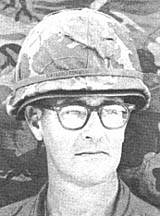 |
TAKING COMMAND of the 2d Battalion (Mechanized), 22d Infantry in recent ceremonies at Fire Support Base Wood III was Lieutenant Colonel John R. Parker of Galveston, Tex. Parker, who previously served in the Office of the Dean at West Point, succeeds Lieutenant Colonel Bruce F. Williams. |
| Children Have Unseen Admirer TAY NINH - Although the children of Tay Ninh Orphanage have never seen her, they all love Mrs. Idamae Daubek of San Jose, Calif. The generous woman has taken it upon herself to send packages to the children of Tay Ninh Orphanage for the last several years. Her oldest son was a doctor with the 25th Infantry Division three years ago and told her about the children’s need. She has been answering that need ever since. Major Mace T. Jett, 1st Brigade Chaplain, and Major David C. Kiger, 1st Brigade S-5, assisted by Specialist 4 Brady Thomas and Specialist 5 James A. Dale, delivered 23 packages to the happy children at the orphanage. The packages contained clothes, toys for everyone, balloons, paper and pencils and many other useful items. Ages of the children range from tiny babies to 10 and 12 year olds. Chaplain Jett is writing a thank you letter to Mrs. Daubek on behalf of the orphanage staff and children. |
C-and-C Ship Helps Gunships Down 18
By PFC GREG STANMAR
CU CHI - Eighteen enemy soldiers were killed recently when a Golden Dragon
command-and-control ship took over the fighting from gunships of the 116th
Assault Helicopter Company.
Early in the evening gunships operating with the 1st Battalion, 49th ARVN
Regiment spotted 12 to 15 enemy running for cover.
The gunships opened up on the enemy, but with little fuel left, they were
forced to return to Cu Chi. The command-and-control ship of Lieutenant Colonel
Crutchley, commander of the 2d Battalion, 14th Infantry took over the pursuit of
the enemy.
“The machine gunners and Colonel Crutchley armed with his M-16 kept the enemy
pinned down until air strikes and artillery could be brought in,” said Sergeant
First Class Guadalupe Lopez of Loredo, Tex.
When the firing ceased the ARVNs swept the area.
“A short time later smoke was spotted coming out of an old hootch. The
gunships opened fire,” Lopez said. “They killed four right off and got a fifth
on the run.”
| SHERIDAN CREWS of the 3d Squadron, 4th Cavalry now have their own unit patch, depicting a charging rhino with lightning in his eyes. The patch was designed by the Electro-Optical Systems, a Xerox Company, especially for the Sheridan tank crews. Heraldry of the patch reads: “Dauntless and tough describe the stalking rhino and his modern military counterpart, the army’s new Sheridan vehicle.” |
 |
Deuces Down Three Enemy Hiding in Hut
By SP4 DENNIS BRIES
TAY NINH - Careful surveillance of an abandoned farmer’s hut paid off in
captured weapons, medical supplies, clothing and documents for a Triple Deuce
ambush patrol. A gunship called in to provide support killed three enemy
soldiers as they fled the hut, leaving the cache.
First Lieutenant Wayne Armour of Libertyville, Ind., led the first platoon
ambush patrol of Alfa Company, 2d Battalion (Mechanized), 22d Infantry across an
open area toward the hootch. As they set up for the night they could see a
farmer lingering around an abandoned hut. After dark, the patrol spotted three
enemy approaching.
ARMOUR said, “We left early to set up and watch the hootch as we have on
several other occasions.”
The patrol moved toward the hootch after the three enemy had entered the
area. Specialist 4 Dale Hakman of Effingham, Ill., recalled, “We could see them
smoking and joking as we got closer. They couldn’t have suspected we were there
because we could see them by the candles.”
PRIVATE First Class Dave Shaffer of Portage, Ind., added, “Just after we
opened up on them we got some return AK fire but they left in a real hurry.
As the enemy fled toward a nearby woodline, a gunship killed three of them.
They left behind one AK-47 rifle, one pistol, a supply of ammunition, grenades,
web gear, civilian clothes, medical supplies, and documents.
Alfa Troop Stops the Press
Underground Print Shop Uncovered
By SGT TONY CAMELIO
CU CHI - Raiders from Alfa Troop, 3d Squadron, 4th Cavalry struck a severe
blow to enemy propaganda activities by discovering a 1500-pound printing press
and over two tons of pamphlets and paper in the Boi Loi Woods 15 miles northwest
of Cu Chi.
The Raiders three days prior had blown numerous bunkers in the area, but had
been unable to check them out thoroughly due to threatening darkness. Returning
to the same place, the Raiders led by Staff Sergeant Kermit W. Garrett of
Jamestown, Tenn., found their big prize.
“I SAW a huge mound of dirt and a hole next to it that looked like an air
vent to a bunker,” said Garrett. “We searched the area around it looking for a
trap door, but couldn’t find one, so we decided to dig around the air vent.”
After digging through dirt, sawing through wood and picking through cement
the Raiders finally made it into the hole.
Specialist 4 Michael Hanh of Newark, N.J., was the first man in the hole. “I
couldn’t believe my eyes,” said Hanh. “There was enough equipment in there to
print a whole newspaper.”
STACKED against the walls of the huge six foot high, 30 foot by 40 foot
bunker were rows and rows of type, 37 trays in all, a table with bottles of ink
and dyes in five gallon cans, stacks of pamphlets, paper, and in the back, the
1500-pound printing press in perfect working order.
The Raiders easily passed out the trays of type, inks, dyes, pamphlets, and
paper to the surface, but getting the press out was another thing altogether.
It took a “slick” from the 25th Aviation Battalion to get that out.
Continuing the search of the area the cavmen found the trap door. Inside
were a paper cutter and almost another ton of paper.
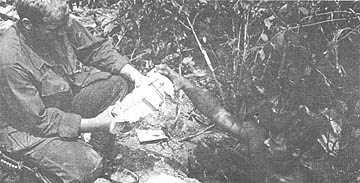 |
|
| (Above) A lot of reading - Private First Class Robert J. Klinger of Pottsville, Pa., passes a stack of enemy propaganda pamphlets to Staff Sergeant Kermit W. Garrett of Jamestown, Tenn. The pamphlets were found along with a printing press by Alfa Troop, 3d Squadron, 4th Cavalry. (Right) Specialist 5 John E. Striven of Fair Oaks, Calif., delicately balances himself while waiting to receive another tray of type from the hole. Specialist 4 Michael Hanh of Newark, N.J., is the next one in line to receive the trays. (Photos by SGT Tony Camelio) |
 |
Page 4-5 TROPIC LIGHTNING NEWS December 8, 1969
Tanks, but No Tanks
Dreadnaughts Go Straight Leg
TAY NINH - Headquarters Company, 2d Battalion, 34th Armor’s reconnaissance
platoon has a new outlook. When the area around Nui Ba Den became very wet
during the rainy season, the Tropic Lightning armormen took to the ground to
perform their sweep missions.
The armormen work out of Fire Support Base Buell, near the Black Virgin
mountain. A typical day begins as they comb the local area with Regional and
Popular Forces from Tay Ninh Province and then move by vehicle to the next
designated area.
Once the unit arrives at the area, the members dismount with their allied
counterparts and proceed with the mission. Their vehicles are then taken to a
blocking force position.
The going is rough through rice paddies and thick underbrush around Nui Ba
Den, but keeping one eye to the ground and the other on the mountain, the
armormen continue to look for any sign of Charlie.
As day stretches out the armormen come upon their blocking force and their
“mobile homes” - the armored personnel carriers.
Mounting their vehicles, they look over the mountain and think back on the
day’s activities and then wearily ahead to the long day that awaits them
tomorrow.
|
Photo Feature By Sgt. Wally Baker |
 |
Up the hill, down the hill, around the hill. |
| DISMOUNTED ARMORMEN and local Regional Force troops start a combined sweep operation near the base of Nui Ba Den, the Black Virgin mountain. The reconnaissance platoon of Headquarters Company, 2d Battalion, 34th Armor abandoned its tracked vehicles for straight leg duty during the rainy season. The Dreadnaughts operate out of Fire Support Base Buell. |
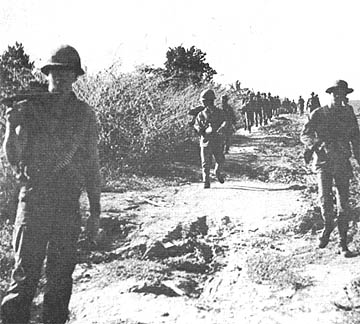 |
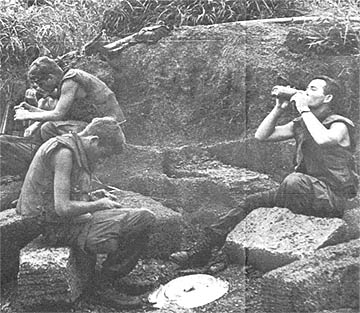 |
A handy laterite pit makes an ideal spot for a long awaited break |
| PFC Tommy Hines is deep in thought during a short rest. |
 |
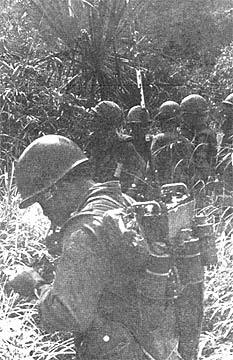 |
CHECKING POSITION - Platoon leader First Lieutenant David A. Ray III, second from right, of Stillwater, Okla., checks his position as an allied sweep force spots a cave on the side of Nui Ba Den. Ray leads the reconnaissance platoon of Headquarters Company, 2d Battalion, 34th Armor. |
| A rifleman and an RTO cross a stream. |
 |
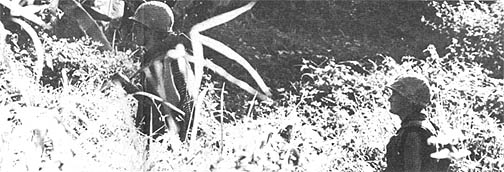 |
| It’s a long hike up the mountain for two Dreadnought armormen on a sweep. |
 |
| A combined sweep force of Dreadnaught armormen and Regional Forces moves out at the foot of Nui Ba Den. |
Page 6 TROPIC LIGHTNING NEWS December 8, 1969
Clan Hosts Radar School; ‘Big Ear’ Crews Get Word
By SP4 PAT MORRISON
CU CHI - The men who operate the portable “big ears” of the 25th Infantry
Division are now being trained right here by experienced Tropic Lightning radar
instructors.
A new ground surveillance radar school was opened recently on the use of
electronic enemy detection devices, hosted by the 3d Battalion, 13th Field
Artillery.
Before the radar school opened division radar crewmen journeyed to the USARV
radar school at Long Binh for classroom instruction.
Class sessions on the highly accurate AN/PPS-5 target surveillance radar
system will run through Dec. 13. The four-day sessions are expected to train
about 90 Tropic Lightning radarmen.
The school will provide the first formal training for some radarmen and serve
as a refresher course for others. Nearly all the radarmen have had some field
experience.
The course includes operation and maintenance of the sophisticated AN/PPS-5
detection equipment and offers 12 hours of practical exercises designed to teach
the set’s users to identify the different sight and sound impulses picked up by
the system.
As an example of how effective the radar system can be, one radar instructor
gave this actual battlefield example: a radar team operating in the Plain of
Reeds in late September detected enemy movement quite a distance from its
location. They radioed the location of the movement to Alfa Battery, 2d
Battalion, 4th Artillery. Moments later, 105mm artillery rounds found their
target. A sweep of the area by infantrymen the next day yielded a mortar tube
and a body count of three.
Sergeant First Class Wayne A. Wildes, NCOIC of the new Cu Chi radar school,
stresses, “The effectiveness of this set is in direct proportion to the
proficiency of the operator - his ability is to identify the returning audio
signals.”
“By setting up this school to train PPS-5 operators,” Wildes continued, “we
are sending men to the field who are proficient enough with their radar sets to
provide the unit commander with one of his most dependable means of target
detection.”
|
|||
|
Ask Sgt. Certain
DEAR SERGEANT CERTAIN: The other day, I went to the aid station to bring my shot
record up to date before leaving on R&R. As soon as I entered the door, I was
pounced upon by a grinning medic with a needle in his hand who told me I needed
25 shots including a vaccination against Saint Vitus Dance. When I told him I
was going to Australia, he smiled and said I needed a special injection to
prevent my catching the legendary pouch-and-mouth disease from contagious
kangaroos. By the time I left, my arm felt like a pop-up target at a basic
training rifle range, and I’m afraid to take my polio sugar cube for fear that
it’s cyclamate. How can I enjoy my R&R?
Punctured Dreams
DEAR PUNC: Well, of course, we all know from listening to AFVN that shots are no
fun. According to the ARs and established SOP, medics WILL grin and talk about
old patients who collapsed from the pain while giving injections. This is
standard. We all know, too, that Australian pouch-and-mouth disease is a big
threat to R&R personnel. In fact, there is an island off the coast of Tasmania
where incurable pouch-and-mouth patients are sent and from which they seldom
return. As for the sugar cube, my informants in the division surgeon’s office
report that all cyclamate was removed from sugar cubes last January when a new
artificial sweetener made from cane and beets came on the market. So relax and
enjoy R&R.
DEAR SARGE: I have heard that the Viet Cong are offering a 1970 Corvette,
$100,000 and free all-expenses paid vacation for two in Las Vegas with a Polish
girl who looks just like Raquel Welch to any GI who chieu hois to their side.
Is there any truth to this rumor?
Loyal But Greedy
DEAR LBG: It is disgusting that you would even consider this. You should be
ashamed of yourself for such disgraceful thoughts. How can you live with
yourself? However, if you’re SURE she looks just like Raquel Welch, you’d
better send us the address you’re supposed to apply to so we can check it out.
DEAR SERGEANT: Is it true that you really don’t exist but are only part of a
vast plot to overthrow the Tropic Lightning News and establish a coalition
editorship with the Viet Lang?
Worried
DEAR WORRIED: Balderdash. I am now, always have been and will continue to be
exactly what I was.
Page 7 TROPIC LIGHTNING NEWS December 8, 1969
Got an Ailing
Aircraft Around?
725th’s Echo Keeps ‘Em Flying
PHOTOS AND STORY
BY
SP4 FRANK DITTO
SUPPORT - From every aspect of responsibility in the Army, general support is
necessary. Ground troops are supported by logistics, artillery, and air
operations. Each of these support elements draws its strength from additional
support elements.
One of these “behind the action” groups is Echo Company, 725th Maintenance
Battalion. Echo Company provides support for the helicopter aircraft of the
25th Infantry Division.
Its job is to keep the helicopters in top flying condition; from the smallest
vibration adjustment to major body work, engine repair and armament control.
Field maintenance on 85 aircraft is the primary task of E Company. The
helicopters come from Alpha and Bravo Companies, 25th Aviation Battalion; Delta
Troop, 3d Squadron, 4th Cavalry, DIVARTY, and the division’s three brigades.
For the men of the “twice removed” support unit the hours are long and often
tedious. But without the aid offered by the unit the aircraft would not
continue to fly.
“The hard we do immediately - the impossible takes a little longer” is the
fitting motto of Echo Company, 725th Maintenance Battalion.
 |
The armament shop - teeth for gunships. |
| Cobra transmission swings into place. |
 |
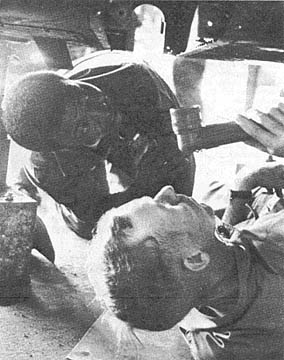 |
Close inspection of Cobra landing gear. |
| Testing for high frequency vibration in LOH tail rotor. |
 |
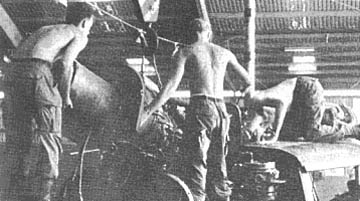 |
A new engine for a UH-7 D Huey |
| An LOH hovers during final inspection tests after repair. |
 |
Page 8 TROPIC LIGHTNING NEWS December 8, 1969
Six Enemy Stung By Hounds, Hornets
By SP4 PHIL JACKSON
FSB JACKSON - Within a 24-hour period, the combined forces of the 2d
Battalion, 27th Infantry and the 116th Assault Helicopter Company “Stinger” gunships killed six enemy and captured and destroyed various enemy supplies,
weapons and defensive positions.
The area of action was near Hiep Hoa, 13 miles west of Cu Chi base camp.
Charlie Company, working out of Patrol Base Harris, was sweeping a suspected
enemy area. They found what appeared to be an overnight position.
There the Hounds found 350 pounds of sugar, salt and rice, two bunkers with
overhead cover and a booby trapped grenade.
Before they left the area they destroyed an additional three booby traps, a
bunker and a tunnel.
Later in the day, the combined 2d Wolfhound and Popular Force Reconnaissance
platoon received fire from 10 VC in the same area that Charlie Company was
working earlier. They returned fire with small arms. A sweep of the area
produced an AK-47, grenades and equipment.
Wolfhounds, working late in the day with the Hornet Helicopter Company, came
under enemy small arms fire approximately six miles east of the action earlier
in the day. “Stinger” gunships killed three enemy as they fled into a hut.
 |
TRICKY TRIP - Fake extractions during the “Super Bushmaster” were practiced to deceive the enemy about troop location. Golden Dragons of the 2d Battalion, 14th Infantry and Warriors of the 2d Battalion, 12th Infantry killed 32 during the three-day operation. (Photo by PFC Greg Stanmar) |
32 Foe Trip on Super ‘Bush
(Continued From Page 1)
The Warriors’ Bravo Company sprang an ambush on 8 to 12 enemy. The enemy
returned fire with AKs. When the firing stopped and the smoke cleared, the area
was illuminated. The Warriors then swept through the area finding five enemy
bodies, two AK-47s and K-54 pistol and an assortment of documents and clothing.
The following morning the Warriors’ Delta Company popped an ambush. A number
of blood trails were found leading away from the area where the action took
place, but no enemy bodies were found. Equipment and medical supplies were
found when the company swept the area.
THE NEXT EVENING found the “Super Bushmaster” still in progress. Most of the
companies were in position shortly after sundown.
It wasn’t long before Alfa Company Warriors started the action by springing
two ambushes within 40 minutes of one another.
The operation moved into the third day with a number of successful ambushes
to the credit of the men of the Fire Brigade.
SWEEPS OF the ambush sites resulted in the capture of large quantities of
enemy weapons, supplies, equipment, clothing and documents.
The weary infantrymen of the 2d Battalion, 12th Infantry and the 2d
Battalion, 14th Infantry were airlifted back to Fire Support Bases Pershing and
Patton for a well-deserved rest.
Their mission was accomplished. The enemy had been put off balance once
again. It will be some time before the Communists will attempt to move men and
supplies through those areas south of the Ho Bo and Boi Loi Woods without
recalling the elements of the “Super Bushmaster” that were there when they least
expected.
Foe Finds Trails Treacherous
By PFC GREG STANMAR
Walking down a trail, any trail in the 2d Brigade’s area of operations, is
strictly hazardous duty for enemy hoping to use the cover of night to relocate,
resupply or recover.
This has been especially true with the increased number of night operations
being carried out by Fire Brigade infantrymen.
Golden Dragons of the 2d Battalion, 14th Infantry clobbered the enemy in two
consecutive night operations set up on a trail near Trung Lap known as
Seven-Alfa.
Numerous sandal prints had been found there earlier. That night the Dragons
were waiting and ready, and four of the enemy fell prey to the ambush.
The following night six more of the unsuspecting foe were killed by
infantrymen of the Golden Dragons’ Alpha Company.
In addition to the ten enemy killed, the two nights’ activities resulted in
the capture of a recoilless rifle, two AK-47s, two RPG rounds, and seven RPG
boosters.
Night operations such as these combined with the aggressive day operations
are making living in the Fire Brigade’s area of operations a very short-time
situation for the enemy.
 |
HARRUMPH! It’s getting so a self-respecting bull can’t even take a short stroll through the rice paddies any more without falling into a well. However, those fellows in green from the 2d Battalion, 34th Armor happened along not long after the accident and with the help of a strong mechanical bull, they grabbed the real bull by the horns and remedied the situation. (Photo by SGT Wally Baker) |
| The Fallacious Fold-Out Flap Contrary to a popular rumor, the 1969 Tropic Lightning Yearbook will positively not contain a center fold-out of a WAC LRRP in full combat gear. It will, however, contain 220 pages of information concerning the 25th Infantry Division’s fourth year in Vietnam. Eighty pages will be in color and each division unit will have its own section in the book. Price is $5. Delivery can be expected in February. See your Tropic Lightning Association unit representative. |
Lawrence Joel: A Portrait
(Continued From Page 1)
“I FOUND myself face-to-face with the President of the United States,
Secretary of Defense Robert McNamara, General Harold Johnson (former chairman,
Joint Chiefs of Staff) and many senators and representatives from all over the
United States.
Joel describes the three years that followed the presentation as very busy
ones, with requests from organizations, schools and businessmen to attend
banquets and social functions as the guest of honor and speaker.
Articles about him appeared in numerous magazines and newspapers throughout
the country, including Life, Newsweek, Ebony and Time. His hometown newspaper,
in Winston-Salem, N.C., where he was born in 1928, printed a three-day long
“Lawrence Joel” feature story about his life and the actions that resulted in
his winning the medal.
“MY WIFE is delighted by all of it,” he smiles, “and so am I. It was a very
beneficial experience for me, but very hectic, too. I had no secretary to keep
track of dates and appointments, so it kept me pretty busy.
Recalling the actions which earned him the honor, Joel remembers all of it.
“Everytime I think about it, it’s just like I was there again. It seems just
like it happened yesterday. I can remember at least 20 names of guys that were
wounded or,” and he paused for a moment, “killed.”
“I treated men from Alfa, Bravo and Charlie Companies, too, but I especially
remember the men who were in my platoon.” He was attached as a medic to Charlie
Company when the action took place.
“IT WAS,” he added with something of an understatement, “something I will
never forget.”
Neither will his country.
Thanks to:
Douglas Conn, 4th Bn., 23rd Inf., for sharing this issue,
Kirk Ramsey, 2nd Bn., 14th Inf. for creating this page.
This page last modified 03-06-2005
©2005 25th Infantry Division Association. All rights reserved.